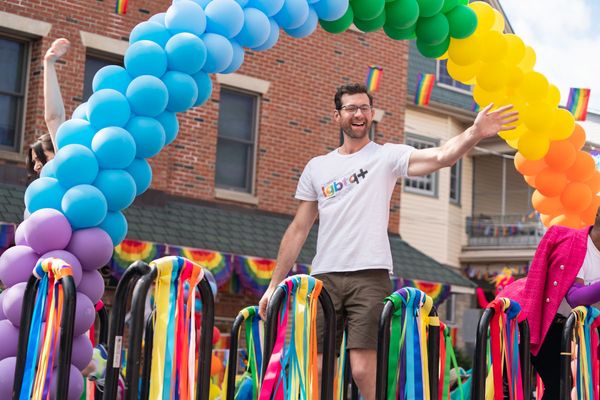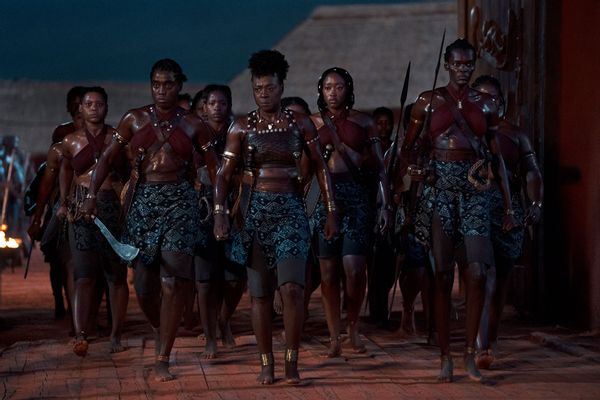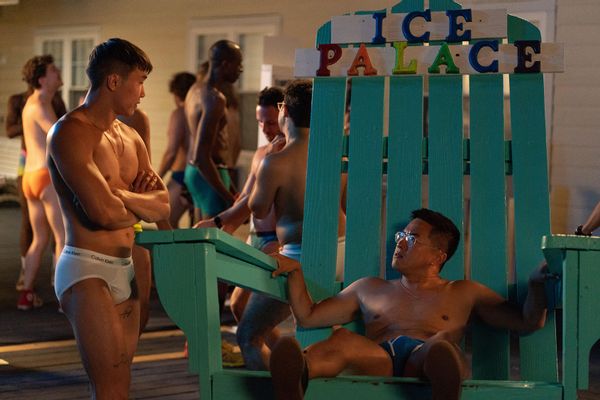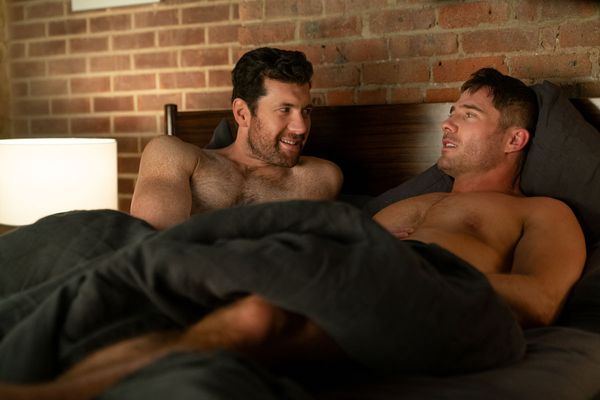The promotion for “Bros” was botched. But its ordinary rom-com trappings may also be to blame
When I was younger and a good deal snottier, my friends and I made ranking movie trailers part of our theater-going experience. Whether the films were trash or glowed with Oscar potential didn’t matter; instead, the determining factor was how much we’d be willing to pay to see them.
The highest honor an upcoming feature might get would be silence or a nod of excitement or interest. A step below that was “Rental.” Below that? “Cable.” And under that: “Basic cable.” The lowest tier was audibly and simply called, “No.”
We all engage in such calculations while sitting in our movie theater seats. The studios know this, just like they know a loud, dumb action movie is a much easier sell than most romantic comedies – even ones toplined by major names like, let say . . . Julia Roberts and George Clooney.
Trailers for their upcoming movie “Ticket to Paradise” are in heavy rotation right now and play up the pair’s classic, road-tested screen chemistry to maximum effect. I’m sure it’ll perform well enough at the box office on its opening weekend. After all, Tom Cruise proved how hungry the audience is to see old-fashioned mega-celebrities in their element through the explosive success of “Top Gun: Maverick.”
But does “Ticket to Paradise” look like an essential, must-see-on-the-big-screen theatrical experience? Hardly. Plenty of people may be looking forward to its video-on-demand debut, preferring to enjoy it at home and wrapped in a cozy blanket, just as we suspect the spirit of Nora Ephron intended.
Julia and George might inspire millions to coax their cakes off their couches and hike to their theaters, but the fact that this is even a question speaks to the severity of the headwinds “Bros” and its writer and star Billy Eichner faced from the start.
 Billy Eichner as Bobby in “Bros” (Universal Pictures)
Billy Eichner as Bobby in “Bros” (Universal Pictures)
In case you haven’t read the voluminous coverage devoted to its, um, performance issues, here’s a brief catch-up: “Bros,” one of the first major studio rom-coms featuring two gay men and an LGBTQ cast, flopped in its opening weekend, earning a paltry $4.8 million total take from 3,350 theaters despite a sizable marketing push from Universal.
“Even with glowing reviews, great Rotten Tomatoes scores, an A CinemaScore, etc., straight people, especially in certain parts of the country, just didn’t show up for ‘Bros,'” Eichner posted in a viral tweet (that now appears deleted) once the box office numbers were in. “And that’s disappointing but it is what it is.”
Is it though?
Many postmortems on the film’s dreadful box office showing have taken issue with Eichner’s assessment, countering with other valid reasons, backed by concrete data points, that the mainstream audience didn’t bite.
A common one points out that historically romantic comedies don’t perform well in October, aka Spooky Season. Witness the strong showing for the horror movie “Smile,” which came out on the same weekend opposite “Bros” to middling reviews but raked in $22 million.
More people in Middle America could recognize “Bros” producer Judd Apatow in a police lineup than its star Billy Eichner.
Another cites the lack of major star power in “Bros,” which may be a shock to those who loved Eichner’s “Billy on the Street” and his Hulu comedy “Difficult People.” That is, until you remember how many times you had to alert your friends and family that those shows existed.
More people in Middle America could recognize the movie’s producer Judd Apatow in a police lineup than Eichner, a truth acknowledged by the absence of Eichner’s face, and that of his co-star Luke Macfarlane, on the poster
However, one point merits some pushback, which is the one positing that Universal’s choice to play up the historic significance of “Bros” ended up spelling its doom. “Moviegoing is not activism, and it’s a mistake to promote a film that way,” reads a Chicago Tribune column’s headline.
This is only slightly less controversial than the verdict from the Los Angeles Times: “The real lesson of ‘Bros’: It’s OK to let gay art bomb.”
Both stories and other journalistic autopsies back up their theses with a few sound points – the Tribune’s especially. But it behooves one to “yes, and” this topic a little further by circling back to my anecdote about assessing a movie’s worthiness by its trailers. One type of movie always received my box office contribution regardless of how the promos looked, and those were and are stories depicting some aspect of my experience that I hadn’t seen on the big screen before.
This is a practice I learned early in life from a mother who, in 1987, took her teenagers to go see the R-rated “Hollywood Shuffle,” a low-budget comedy co-written, produced, directed, and starring Robert Townsend.
At the time very few people in mainstream (read: white) America had heard of Townsend or his co-stars, an entirely Black cast that included John Witherspoon, Damon Wayans, and fellow writer Keenen Ivory Wayans. But the movie represented the culmination of serious hustle on the part of Townsend, who made it on a budget estimated to be around $100,000 and ended up raking in more than $5 million.
A lot of that support came from white American theatergoers, urged on by a thumbs up from Roger Ebert. But this was an era not that far removed from the time when Black Americans still checked the “Television” page in Jet to find out whether a Black person was going to appear on TV in a given week, along with when and in which show. Ergo, Black folks showed up to support Townsend’s self-financed creation in a way that made it stand out as an indie phenomenon.
In 2022 sightings of people of color on TV or toplining movies are far more common than they were even a few years ago.
Nevertheless, the weeks before the release of “The Woman King” brought us headlines like this one from The Wrap: “‘The Woman King’ Dilemma: How Do You Market a Female, Black African Action Drama?” Reading between the lines, this tacitly asks whether white audiences would show up to see a film about African warriors, set on the continent and featuring dark-skinned Black women.
 Lashana Lynch, Viola Davis, Shelia Atim, Sisipho Mbopa, Lone Motsomi and Chioma Umeala in “The Woman King” (Sony Pictures/Ilze Kitshoff)
Lashana Lynch, Viola Davis, Shelia Atim, Sisipho Mbopa, Lone Motsomi and Chioma Umeala in “The Woman King” (Sony Pictures/Ilze Kitshoff)
Sony was already delivering the answer by marketing it as a bold, athletically fierce action movie and focusing on its Oscar-winning lead Viola Davis. “The Woman King” also debut to a flurry of controversy concerning the troubling true history of the slave-trading Dahomey, depicted in the movie as anti-slavery crusaders.
That didn’t prevent it from exceeding its opening weekend expectations by earning $19 million, with 56% of its tickets having been purchased by Black theatergoers, with women making up 58% of the audience. Now, were some of those ticket purchasers motivated to use their dollars to support an action movie directed by a Black woman, and starring Black women, that is not connected to a major franchise such as Marvel? And were they doing so to help prove, yet again, that movies about people of color can be moneymakers? No question. That, in its way, counts as activism.
“The Woman King” would not have performed as well as it did if its promotion didn’t rely on the appeal of a familiar type of mainstream blockbuster presented in new packaging, satisfying action fans and women unaccustomed to seeing versions of themselves swinging blades and kicking ass.
Likening “The Woman King” to “Bros” would seem like an apples and oranges situation, unless you take a step back and evaluate what it offers from the perspective of freshness – which is to say, not much. Peel back the hype – which, based on critics’ reviews, is completely justified – and what you have is an average love story, only one featuring two cisgender white guys, a demographic not exactly lacking for representation in movies and TV.
“Bros” features sex scenes that don’t generally turn up in light romantic comedies.
It’s also R-rated in a genre whose most popular titles are rated PG or PG-13. Yes, the straight films to which “Bros” is compared, “Bridesmaids” and “Trainwreck,” are also rated R. But, again, those were comedy vehicles starring two popular “Saturday Night Live” cast members in the case of “Bridesmaids,” with “Trainwreck” marking Amy Schumer’s first time carrying a feature after “Inside Amy Schumer” made her a star, not to mention one that contained a surprise in the form of John Cena’s natural comedic talent.
 Noah (Joel Kim Booster) and Howie (Bowen Yang) in “Fire Island” (Jeong Park/Searchlight)
Noah (Joel Kim Booster) and Howie (Bowen Yang) in “Fire Island” (Jeong Park/Searchlight)
Their R-ratings also were for general raunchiness, while “Bros” features sex scenes that, again, don’t generally turn up in light romantic comedies. This isn’t to say that films featuring queer stories are obligated to tone down their sexuality or that rom-com starring LGBTQ casts aren’t marketable to a mainstream audience; the word-of-mouth success of Hulu’s “Fire Island” proves that isn’t the case.
Rather, it’s about knowing the genre and what magnetizes the mainstream audience and catering to the film’s marketing accordingly.
“Fire Island” also is unapologetic in its depiction of sex, but its star and writer Joel Kim Booster and its studio Searchlight hooked the straights and everyone in between by promoting it as a Jane Austen adaptation, which automatically piques a specific and rather broad audience’s interest.
That said, Booster’s masterpiece also ran on a streaming service that doesn’t release its ratings, leaving us without a financial metric by which we can measure its audience’s popularity.
But it was marketed foremost as a light-hearted, witty, and colorful movie instead of one that announces to the audience its mission to be seen. And I’m betting that if it received a theatrical run, Asian filmgoers along with other people of color would have shown up for it.
It wouldn’t be honest to declare that homophobia did not play some role in “Bros” lackluster theatrical showing. Look at the anti-LGBTQ atmosphere in the country right now. Expecting a movie about two men falling in love to swing against such strong currents is unrealistic, even if one is played by a guy who has starred in a lot of very popular Hallmark movies.
 Bobby (Billy Eichner) and Aaron (Luke Macfarlane) in “Bros” (Universal Pictures)
Bobby (Billy Eichner) and Aaron (Luke Macfarlane) in “Bros” (Universal Pictures)
That’s also frustrating to acknowledge, given Eichner’s care with and emphasis on featuring a cast of queer actors deserving a brighter spotlight than most have been given. And the fact that mainstream audiences ignored it while making a hit out of “Dahmer – Monster,” a series about a serial killer targeting gay men made by one of the most powerful gay creatives in the industry, is infuriating. Credit is due to actor and writer Jackson Rickun for pointing this out.
“Societally, our net preference is watching grotesque queer death over queer love,” Rickun says in a Twitter thread. “And this isn’t just broadly; it’s an enjoyment of murdering queer people of color, which adds an extra demented layer to the whole discourse.”
Box office tepidness is not equal to creative success, and from all reports, “Bros” hits all the switches that energize a great romantic comedy, something that many people are bound to find out later when they watch it at home or during a flight.
In that forum, it should have the advantage over “Ticket to Paradise.” Julia Roberts and George Clooney may be superstars, but airplane movie services tend to present their titles alphabetically. Regardless of how more people end up watching “Bros,” hopefully the experience will move more of them to support the next queer-centered film that wins a wide theatrical release. And hopefully, the studio behind that movie will promote it to highlight its greatness, trusting that the people who enjoy it will naturally recognize its importance.
Read more
about this topic

